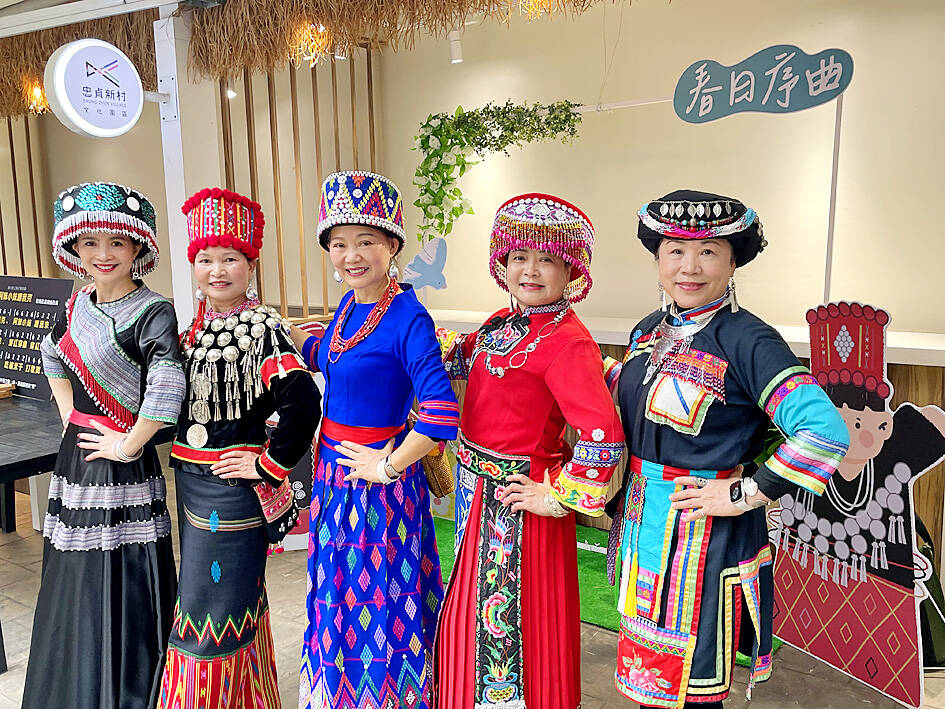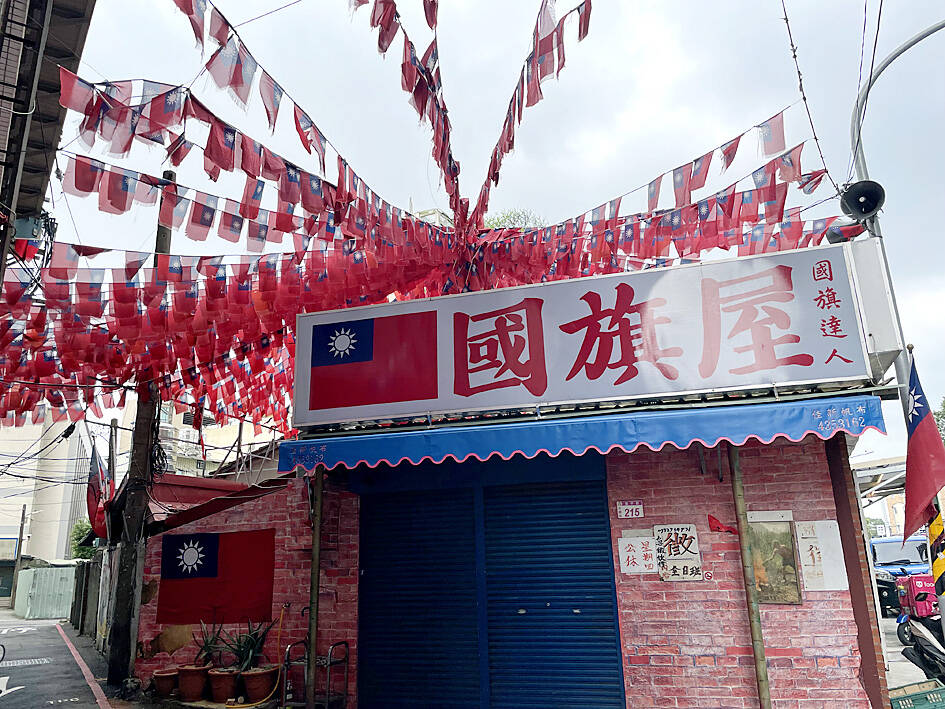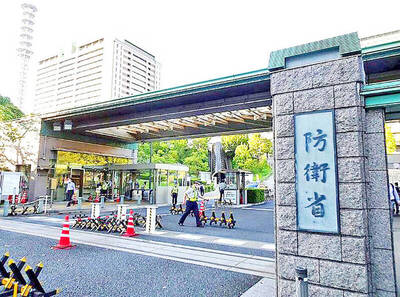A walk in Zhongzheng Market in Taoyuan’s Jhongli District (中壢), quickly reveals that it is not just another traditional Taiwanese market. Rather than selling beef noodle soup or traditional Taiwanese snacks, street vendors sell Yunnan-style rice noodles called migan (米干), Yunnan beef jerky, flaky-layered buns, papaya salad and green bean jelly (豌豆粉).
Instead of only baby bok choy and cabbage, produce stalls sell vegetables that are more commonly found in Southeast Asian dishes: wormwood leaves, lemongrass, wild olives and coriander.
The diversity of food in the market has largely been shaped by inhabitants of Jhongjhen New Village (忠貞新村), formerly a military dependents’ village of predominantly migrants from China’s Yunnan Province after the Chinese Civil War.

Photo: Shelley Shan, Taipei Times
The area, commonly known as Longgang (龍岡), is home to Zhongzheng Market, Jhongjhen New Village Cultural Park, the “National Flag House” and Longgang Mosque. It has been chosen by the Tourism Administration as one of the 100 Tourism Spotlights in Taiwan.
Jhongjhen New Village residents were largely former members of the Yunnan Anti-Communist National Salvation Army, which was formed in 1951 by members of two Republic of China (ROC) units who retreated to the border between Yunnan and Myanmar in 1949 after the Chinese Civil War. General Li Mi (李彌) served as the commander of the anti-communist force.
After the US terminated military support for the insurgency in 1952, Li formed the Southeast Asia Free People’s Anti-Communist Alliance, working with ethnic minorities in northern Myanmar to launch guerrilla attacks against Chinese communists.

Photo: Shelley Shan, Taipei Times
In 1953, the Burmese government filed a complaint at the UN against Li’s military activities in its northern territory, leading the UN to pass a resolution condemning the organization and asking it to leave. As a result, nearly 7,000 military personnel and their families were moved to Taiwan from November 1953 to May 1954. About 900 of them were resettled in Jhongjhen New Village.
The remaining ROC military personnel in Myanmar regrouped and became the Yunnan Anti-Communist Volunteers’ Army to continue guerrilla campaigns, which triggered more complaints from the Burmese government and subsequently led to a second round of deportations in 1961.
Two units remained in what is now known as the Golden Triangle region of northeastern Myanmar, northwestern Thailand and northern Laos.
Meanwhile, the Kuang Wu was established in Myanmar in 1965 to gather intelligence in China. It was disbanded in 1975.
Stories of the ROC’s “Lost Army” were first popularized by Bo Yang’s (柏楊) novel The Alien Realm (異域). The novel was later adapted into the 1990 movie A Home Too Far (異域), directed by Taiwanese director by Kevin Chu (朱延平) and starring popular Hong Kong actor and singer Andy Lau (劉德華).
In 2023, the Ministry of National Defense repatriated the remains of 948 fallen members of the Lost Army, with their names inducted into the National Revolutionary Martyrs’ Shrine in Taipei.
Simon Wang (王根深), a Burmese of Chinese descent, joined the Kuang Wu when he was 15. After six years fighting as a guerrilla in the Golden Triangle and seven years working as an intelligence officer, Wang came to Taiwan in 1979 after the Kuang Wu was dissolved.
He later entered the culinary business, owning several restaurants serving traditional Yunnan cuisine. He founded the Lost Army Story House (異域故事館) in Jhongjhen New Village Cultural Park in 2022.
“During my time in the military, I had seen many of my comrades die before me. I was one of the fortunate few who came to Taiwan, a country I believe in,” Wang said.
“The Lost Army risked their lives and fought in the jungles of the Golden Triangle area from 1949 to 1981. That part of history should not be forgotten,” he said.
The story house exhibits documents, uniforms and replicas of guns used by the Lost Army. It includes tools that Wang used to gather intelligence, such as a spy camera lighter, a pen gun and a Morse code machine. The museum also includes an exhibit on how intelligence operatives hid their Morse code machine in an urn underground and placed charcoal next to it to prevent it from being damaged by humidity.
Wang’s sister-in-law, Li Fu-ying (李福英), came to Taiwan in 1976. Her father, Li Wan-Ching (李萬錦), was a member of the Lost Army and was ordered to continue guerrilla warfare in the Golden Triangle. Her mother is Lisu, an ethnic minority in Yunnan. The family sold migan after relocating to Jhongjhen New Village.
At one point, more than 60 migan vendors were operating around Jhongjhen New Village, Li Fu-ying said.
“We like to call them flavors forged in strife, flavors that were created by incorporating ingredients and spices that these families had tasted while sojourning through the Golden Triangle area,” she said. “There is no need for us to compete against each other, because each restaurant owner has a unique life story to tell and prepares migan with their distinct flavor.”
Although homes in Jhongjhen New Village were demolished to make way for modern residential buildings, most of the residents still prefer to shop at Zhongzheng Market, which now has stalls run by immigrants from Thailand, Myanmar and Indonesia.
Flag House Migan (國旗屋米干) is owned by Yunnan native Chang Lao-wang (張老旺), whose father was a leader of the Yunnan Anti-Communist National Salvation Army. Chang is known as the national flag expert, having decorated the exterior of his restaurant with thousands of small flags.
Separated by the Chinese Civil War, Chang’s family was reunited in the Golden Triangle area. His childhood was spent following his father in guerrilla warfare.
“My mother had sewn a flag using red, white and blue cloth she found and gave it to the men working with my father,” Chang said in an interview for a historic archive project. “She told them that, when the shooting stopped on the battlefield, and if her husband was still alive, they should put up the flag on high ground. If he died, they should put it next to him so we can collect his body and bury him.”
Chang and his family came to Taiwan when he was 11. His passion to buy and hang national flags began after his father died, when he found an old box under his father’s bed.
“I found a bloodstained flag in the box and was getting emotional about it. It was this flag that saved my father’s life and brought him to Taiwan. I vowed to hang the national flag for the rest of my life,” he said.
Chang, 84, would also hang up thousands of flags in the community to form a “national flag tunnel” for annual Double Ten National Day celebrations and host a flag-raising ceremony.
He said that he would continue to buy flags and hang them up as long as he still lives, even though doing so has nearly depleted his savings and caused his first wife to leave him.
The Longgang Mosque, one of 11 in Taiwan, was built in 1964 for Muslim soldiers settling in Jhongjhen New Village. Before the mosque, Muslim members of the community often traveled to the Taipei Grand Mosque for religious services.
With funds raised through the Chinese Muslim Association and sponsorship from Saudi Arabia, a property of approximately 1,295m2 was procured to build a place for worship for 150 people, which was reconstructed in 1989.
With a Baptist church and a pork knuckle restaurant as its neighbors, the mosque has become a symbol of coexistence and harmony in the community, Li Fu-ying said.
The community has been holding the Taoyuan Longgang Rice Noodles Festival since 2011. It comprises three main programs: the Long Street Banquet, the Water-Splashing Festival and the Torch Carnival.
The Long Street Banquet is a traditional festival of the Hani people, celebrated as a communal feast of gratitude and sharing. The meal is presented on a large bamboo tray holding a variety of Yunnan-style delicacies, such as two-colored rice and crispy fried pea jelly.
The organizers set up 264 tables in three sessions for reservations during this year’s festival in April, with all tables booked within 24 hours.

LOOKING NORTH: The base would enhance the military’s awareness of activities in the Bashi Channel, which China Coast Guard ships have been frequenting, an expert said The Philippine Navy on Thursday last week inaugurated a forward operating base in the country’s northern most province of Batanes, which at 185km from Taiwan would be strategically important in a military conflict in the Taiwan Strait. The Philippine Daily Inquirer quoted Northern Luzon Command Commander Lieutenant General Fernyl Buca as saying that the base in Mahatao would bolster the country’s northern defenses and response capabilities. The base is also a response to the “irregular presence this month of armed” of China Coast Guard vessels frequenting the Bashi Channel in the Luzon Strait just south of Taiwan, the paper reported, citing a

A total lunar eclipse, an astronomical event often referred to as a “blood moon,” would be visible to sky watchers in Taiwan starting just before midnight on Sunday night, the Taipei Astronomical Museum said. The phenomenon is also called “blood moon” due to the reddish-orange hue it takes on as the Earth passes directly between the sun and the moon, completely blocking direct sunlight from reaching the lunar surface. The only light is refracted by the Earth’s atmosphere, and its red wavelengths are bent toward the moon, illuminating it in a dramatic crimson light. Describing the event as the most important astronomical phenomenon

ENHANCING DETERRENCE: Stationing the missiles in Kyushu would allow Japan to cover waters near Taiwan and China’s coastal areas without any logistical difficulties Japan is to deploy extended-range anti-ship missiles at a Ground Self-Defense Force base in Kumamoto to bolster its defenses, the Yomiuri Shimbun reported on Saturday. The upgraded Type 12 surface-to-ship missile, with a range of more than 1,000km, would be capable of striking targets in the Taiwan Strait and along China’s coast. Originally limited to a few hundred kilometers, the Type 12 was recently modernized ahead of schedule. Deployment, initially slated for next year, has been accelerated after the upgrade was completed sooner than expected, the newspaper said. Stationing the missiles in Kyushu would allow Japan to cover waters near Taiwan and

The presence of Taiwanese politicians at China’s military parade tomorrow would send the wrong message to Beijing and the international community about Taiwan’s sovereignty and democracy, a national security official said yesterday. China is to hold the parade tomorrow to mark the 80th anniversary of Japan’s surrender in World War II. By bringing together leaders of “anti-West” governments such as Russia, North Korea, Iran and Belarus, the parade aims to project a symbolic image of an alliance that is cohesive and unbending against Western countries, the national security official said, speaking on condition of anonymity. Former Chinese Nationalist Party (KMT) chairwoman Hung Hsiu-chu